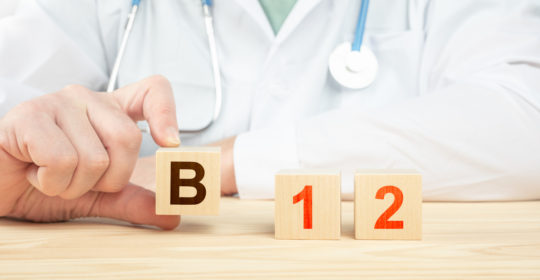
Do you need a vitamin B12 supplement?
Taking supplements and multivitamins is a common way for people to stay healthy. Some nutrients, such as vitamin B12, our bodies cannot produce. It is essential that through our diet, or supplements, we get these needed nutrients. Vitamin B12 is one of the eight B vitamins that form the B complex. We cannot overdose on these B vitamins, but we want to help you figure out what vitamin B12 is and if you need to take supplements.
What is vitamin B12 and how do we get it?
A water-soluble vitamin, B12, is similar to the other B vitamins, meaning it dissolves in water and travels into the bloodstream. Our bodies store the B12 it needs in our liver for years while any excess amounts our bodies remove via the digestive tract. Vitamin B12 is essential to the human body: it helps with the formation of red blood cells, DNA synthesis, and the maintenance of the central nervous system. Our bodies are unable to produce vitamin B12, so we must get this vitamin from our diet. B12 is a vitamin that may be naturally occurring in some foods but added to others. The best food sources for B12 include meats, fish, eggs, and dairy.
What is the daily requirement for vitamin B12?
The recommended daily amount for B12 is about 2.4 micrograms, and most can achieve this goal. For those who are pregnant, the recommended amount is 2.6 micrograms, and for those who are nursing, the recommended amount is 2.8 micrograms. However, for those with vegan and vegetarian diets, it is crucial to look at food sources for B12 to ensure you are meeting your daily intake of the vitamin. Fortified foods can be a great source of B12 for vegans and vegetarians. Essentially, these types of foods do not naturally contain a lot of vitamins and nutrients, so they are added to cereals, yeasts, and non-dairy milk to provide more nutritional value.
Why take a vitamin B12 supplement?
Choosing to take vitamin B12 supplements is something that you should talk about with your doctor. B12 supplements are for those with deficiencies or those who cannot get their daily intake through diet alone. It is also important to note that B12 supplements are known to interact with certain medications, and certain medications can negatively affect your B12 levels, specifically Gastric acid inhibitors and Metformin.
Certain groups of people can be more likely to have a vitamin B12 deficiency. These at-risk groups include older adults, those with pernicious anemia, individuals with gastrointestinal disorders, or those who underwent gastrointestinal surgery.
The symptoms of a vitamin B12 deficiency include strange sensations, numbness, or tingling in the hands, legs, or feet; difficulty walking such as staggering or balance problems; anemia; a swollen, inflamed tongue; difficulty thinking and reasoning, or memory loss; weakness and fatigue. Your doctor will be able to confirm a vitamin B12 deficiency after talking through your medical history, doing a physical exam, and taking a blood test.
What are your vitamin B12 supplement options?
After meeting with your doctor, if you find that you have a B12 deficiency, it can be corrected. Your options are either B12 shots or high-dose B12 pills. If you have a more mild deficiency, your doctor may recommend a multivitamin. Many multivitamins on the market contain vitamin B12, but some of our favorites are HUM, OLLY, Ritual, and Nature Made. If you are looking for a B12 supplement and not a multivitamin, our favorites include Nature Made, Salt Lake Supplements Vitamin B12 Liquid, and Solimo Vitamin B12.
Most commonly, you will find B12 in the form of cyanocobalamin in a multivitamin. It can also come in the form of adenosylcobalamin, methylcobalamin, and hydroxycobalamin. Cyanocobalamin is a synthetic form of vitamin B12. Our bodies convert cyanocobalamin into adenosylcobalamin and methylcobalamin. While cyanocobalamin contains a cyanide molecule, this gives it stability in products and the body, and it is perfectly safe to ingest in small doses. Though it is the cheapest form of Vitamin B12, it is highly effective.
Adenosylcobalamin and methylcobalamin easily absorb into our systems and work together. These are both naturally occurring though multivitamins containing them can be on the more expensive side. Hydroxycobalamin is for treating those with a more severe case of vitamin B12 deficiency. It is only for prescriptions and typically administered through a shot or IV drips.
So do you need a B12 supplement?
If you are looking at taking vitamin B12 supplements as a preventive measure against future health problems, the evidence is inconclusive. There is no definitive proof that B12 can prevent anything from cancer to Alzheimer’s disease. Remember, our body uses the B12 that it needs, stores away any additional for years, and expels the excess amounts. So unless you have a deficiency or your diet does not provide enough vitamin B12, it is best to consult with your doctor to see if supplements are right for you.
Leave a reply →